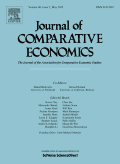
JOURNAL OF COMPARATIVE ECONOMICS
Scope & Guideline
Connecting Cultures Through Economic Analysis
Introduction
Aims and Scopes
- Comparative Economic Analysis:
The journal focuses on comparative studies of economic systems, evaluating how different institutional frameworks, policies, and historical contexts shape economic performance and development. - Impact of Political Factors on Economics:
A significant emphasis is placed on how political dynamics, such as governance, populism, and institutional constraints, influence economic decisions and outcomes. - Sector-Specific Economic Studies:
The journal publishes research on specific sectors such as education, finance, and health, analyzing their roles in broader economic contexts and their effects on growth and development. - Empirical Investigations and Methodologies:
A strong methodological focus is evident, with many papers utilizing empirical evidence, statistical analyses, and case studies to validate theoretical claims and explore economic phenomena. - Global Economic Trends and Crises:
The journal frequently addresses global economic trends and crises, assessing their impacts on various economies, with a particular focus on the aftermath of events like the COVID-19 pandemic.
Trending and Emerging
- Digital Economy and Gender Participation:
Recent research has begun to emphasize the intersection of technology and economic participation, particularly focusing on how the digital divide affects women's economic integration in various regions. - Impact of Populism on Economic Policy:
The rise of populist movements globally has led to increased scrutiny of their effects on economic policies, particularly central bank communication and fiscal strategies, marking a significant shift in analysis. - Environmental Economics and Public Debt:
There is a growing focus on the relationship between ecological transitions and economic frameworks, particularly how constitutional constraints on public debt interact with sustainable development goals. - Comparative Analysis of Health Economics:
The health consequences of crises, such as the COVID-19 pandemic and regional conflicts, have emerged as critical areas of study, with researchers investigating their economic implications across different contexts. - Financial Development and Economic Growth:
Research is increasingly highlighting the connections between financial development and broader economic growth, exploring both short-term and long-term impacts across various regions.
Declining or Waning
- Traditional Economic Models:
There seems to be a decreasing focus on conventional economic models, such as the quantity theory of money, as researchers shift towards more dynamic and context-specific analyses. - In-depth Studies on Developed Economies:
Although developed economies are still relevant, there is a noticeable decline in papers specifically targeting issues within these economies, as researchers increasingly turn their attention to emerging markets and transition economies. - Static Analysis of Economic Policies:
Research that offers static evaluations of economic policies without considering dynamic impacts or long-term effects is becoming less frequent, reflecting a shift towards more comprehensive and longitudinal studies. - Regulatory and Institutional Comparisons:
While still a topic of interest, there is a decline in papers that solely focus on the regulatory frameworks of individual countries without comparative insights, as scholars seek more integrated analyses.
Similar Journals
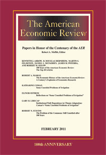
AMERICAN ECONOMIC REVIEW
Shaping the Future of Economics Through Rigorous Research.AMERICAN ECONOMIC REVIEW, published by the American Economic Association, stands as one of the most prestigious academic journals in the field of Economics and Econometrics. With an impressive impact factor and ranking of #9 out of 716 in its category, this journal has achieved a notable position within the top 2% of journals globally, as evidenced by its Q1 classification in 2023. Covering a broad spectrum of economic theory and applied research, it serves as a primary platform for the dissemination of high-quality scholarly work, contributing significantly to the ongoing dialogue within the discipline. Although Open Access options are not available, the journal's rigorous peer-review process ensures that published articles uphold the highest standards of academic integrity and relevance. With coverage spanning from 1973 to 2024, the AMERICAN ECONOMIC REVIEW continues to be an essential resource for researchers, professionals, and students eager to stay at the forefront of economic thought and innovation.
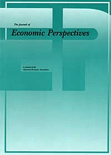
JOURNAL OF ECONOMIC PERSPECTIVES
Unveiling Perspectives that Shape Economic DiscourseJOURNAL OF ECONOMIC PERSPECTIVES, published by the American Economic Association, is a leading academic journal that serves as a vital resource for researchers, professionals, and students in the fields of economics and econometrics. With an impressive impact factor, it ranks in the top Q1 quartile according to the 2023 statistics, demonstrating its significant influence and contribution to the discipline, particularly with a notable Scopus Rank of #21 out of 716 in the category of Economics and Econometrics. Spanning from 1992 to 2024, the journal provides a platform for rigorous and comprehensive analyses that illuminate contemporary economic issues and perspectives. While it does not currently offer open access options, its thorough and insightful content ensures it remains a respected and essential part of economic literature, addressing a diverse array of topics that resonate with the academic community.
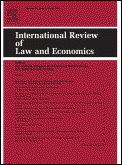
INTERNATIONAL REVIEW OF LAW AND ECONOMICS
Illuminating the Nexus of Law and Economic Analysis.The INTERNATIONAL REVIEW OF LAW AND ECONOMICS, published by Elsevier Science Inc, stands as a premier academic journal dedicated to the interdisciplinary exploration of law and economics since its inception in 1981. With an impressive convergence of insightful research and theoretical advancement, the journal encapsulates critical findings that bridge legal studies and economic principles. Ranked in the Q2 category for Economics and Econometrics and Finance, alongside a notable Q1 ranking in Law, it highlights its significant influence and high-quality scholarship within the academic community. The journal is indexed in Scopus, achieving commendable rankings which reflect its importance, ranking #188 out of 1025 in Law and #343 out of 716 in Economics and Econometrics. With no Open Access option specified, readers are encouraged to engage with the content through institutional access or subscription. This journal is essential reading for researchers, practitioners, and scholars looking to deepen their understanding of how legal frameworks intersect with economic theories, making it a vital resource in both fields.
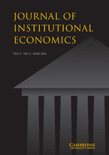
Journal of Institutional Economics
Empowering Research at the Intersection of Governance and EconomicsJournal of Institutional Economics, published by Cambridge University Press, stands as a premier forum for the dissemination of research at the intersection of economics, institutions, and governance. With an ISSN of 1744-1374 and E-ISSN 1744-1382, this journal has established itself as a vital resource within the academic community, achieving an impressive Q1 ranking in the field of Economics, Econometrics and Finance as of 2023. The journal's focus on institutional analysis not only enhances our understanding of economic phenomena but also fosters interdisciplinary dialogue among scholars and practitioners alike. With a commendable rank of 39 out of 288 in Scopus rankings, placing it in the 86th percentile, the Journal of Institutional Economics provides access to groundbreaking research that holds significant implications for policy and decision-making. Researchers, professionals, and students engaged in the study of economic systems will find this journal an invaluable addition to their academic resources.
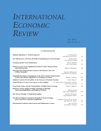
INTERNATIONAL ECONOMIC REVIEW
Elevating the standard of economic scholarship globally.INTERNATIONAL ECONOMIC REVIEW is a prestigious journal dedicated to advancing knowledge in the fields of economics and econometrics. Published by Wiley in the United Kingdom, this journal boasts an impressive Q1 ranking in the 2023 category of Economics and Econometrics, reflecting its significant impact in the academic community. With a continued publication since its inception in 1979, it offers a platform for rigorous scholarly articles that address contemporary issues, theoretical developments, and empirical findings in economics. Although it does not currently offer open access options, the journal maintains broad accessibility through institutional subscriptions. Researchers, professionals, and students are encouraged to contribute to and engage with this leading publication to foster knowledge exchange and stimulate scholarly dialogue in economic research. With its commitment to high-quality scholarship, the INTERNATIONAL ECONOMIC REVIEW remains a vital resource for developing insights that inform both policy and practice.
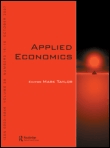
APPLIED ECONOMICS
Bridging Theory and Practice in EconomicsApplied Economics, published by Routledge Journals, Taylor & Francis Ltd, is a revered platform in the field of Economics and Econometrics. Since its inception in 1969, the journal has maintained its commitment to disseminating high-quality research, covering a wide range of topics within applied economics that are critical for understanding and addressing real-world economic issues. With a notable Q2 ranking in Economics and Econometrics and a strong standing in the 67th percentile of Scopus rankings, it serves as an essential resource for researchers, professionals, and students alike, providing insights that bridge theoretical frameworks and practical applications. While the journal is not an Open Access platform, it continues to foster academic discourse and innovation within the economics community, contributing to the ongoing development of evidence-based policies and practices. Its accessibility and robust editorial standards ensure that the latest findings and methodologies reach an engaged audience, further solidifying its reputation as a key publication in the field.

Statistika-Statistics and Economy Journal
Exploring Data, Enhancing Economic Understanding.Statistika-Statistics and Economy Journal, published by the Cesky Statistical Office in the Czech Republic, serves as a vital platform for dissemination and discussion of research in the fields of statistics, economics, and econometrics. With an ISSN of 0322-788X and E-ISSN 1804-8765, this Open Access journal has been committed to promoting free access to scholarly work since 2011, allowing researchers, professionals, and students to engage with valuable content. As of 2023, it holds a Q4 ranking in both the Economics and Econometrics and Statistics, Probability and Uncertainty categories, reflecting its emerging presence within these disciplines. The Converged Years from 2015 to 2024 emphasize the journal’s ongoing contribution to the academic community, while its rankings in Scopus highlight its position among peers. The journal aims not only to foster rigorous academic discourse but also to provide practical insights into the application of statistical methods in economic contexts, ensuring its relevance amidst the evolving challenges of data analysis and economic theory. Its location in Prague positions it at the crossroads of European scholarship, making it a noteworthy resource for those dedicated to advancing the field of statistics and economy.
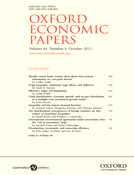
OXFORD ECONOMIC PAPERS-NEW SERIES
Illuminating trends and policies with scholarly precision.OXFORD ECONOMIC PAPERS-NEW SERIES is a prestigious academic journal published by Oxford University Press, dedicated to advancing the field of economics and econometrics. With an ISSN of 0030-7653 and an E-ISSN of 1464-3812, this journal has a rich history since its inception in 1938, and continues to play a vital role in disseminating impactful research through its convergence of years spanning from 1938 to 2024. Recognized as a Q2 journal in the 2023 category of Economics and Econometrics, it ranks #396 among 716 in its field according to Scopus, reflecting a commendable position within the academic community, particularly in global economic discussions. While the journal currently does not offer open access options, it remains committed to providing a platform for rigorous research and critical discourse. Researchers, professionals, and students will find the journal's articles to be essential reading, offering insights that are pivotal for understanding economic trends, policies, and methodologies. Its focus on high-quality scholarship ensures that contributions are both theoretically robust and practically relevant, making it a significant resource in the ever-evolving landscape of economic research.
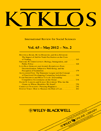
KYKLOS
Advancing interdisciplinary dialogue in Arts, Humanities, and Economics.KYKLOS, published by WILEY, is a premier peer-reviewed journal dedicated to advancing knowledge in the fields of Arts and Humanities as well as Economics and Econometrics. With an impressive impact factor and a robust presence in Scopus rankings, KYKLOS has established itself as a critical resource for scholars, researchers, and professionals, holding a Q1 quartile ranking in the Arts and Humanities category and a Q2 ranking in Economics and Econometrics for 2023. Through its diverse scope, which spans from contributions to historical theory to contemporary economic analysis, the journal aims to foster interdisciplinary dialogue and present innovative research that addresses both theoretical and practical challenges. Although it is not an open-access journal, its rigorous approach and commitment to quality make KYKLOS key to the ongoing discourse within its academic communities. Established in 1947, the journal continues to be a valuable publication, evolving to meet the changing needs of its readership in the dynamic landscape of social science research.

POLITICKA EKONOMIE
Bridging Economics and Political Thought for a Better TomorrowPOLITICKA EKONOMIE is a prominent academic journal published by VYSOKA SKOLA EKONOMICKA in the Czech Republic, focusing on the intersection of economics, sociology, and political science. Established to foster critical discourse within these fields, the journal's ISSN is 0032-3233, and it operates with an E-ISSN of 2336-8225. With a convergence history dating back to 1980, POLITICKA EKONOMIE has become a valuable resource for researchers and practitioners seeking insights into societal and economic dynamics. Although the journal is categorized in Quartile 4 for both Economics and Econometrics and Sociology and Political Science categories as of 2023, it continues to contribute significantly to empirical research and theoretical advancements. Researchers will find that while the journal is not open access, it welcomes submissions that engage with contemporary issues and debates, thereby promoting academic exchange and innovation in the social sciences.